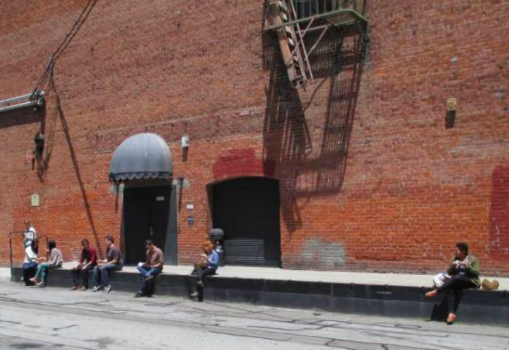The behavior of San Francisco cops, even in an era when the department is supposed to be undergoing major reforms, continues to cost the city money—potentially millions of dollars.
The Police Commission will hear in closed session Wednesday/3 two lawsuits, one by a gay cop who alleges an alarming pattern of homophobia in the department and another by a Black man who alleges he was brutally beaten for no reason.
Officer Brendan Maddix graduated at the top of his Police Academy class in May, 2015, and after a successful training year at the Richmond Station, where he excelled, he was sent to Central Station, where, his complaint alleges, he was “subjected to a year-long campaign of sexist and homophobic harassment led by two sergeants emboldened by a pervasive “Old Boys Club” culture.

The sergeants “openly mocked” Mannix, including during department meetings, told him he wasn’t a “real man,” told him to “gain some weight” and called him “such a queen,” the lawsuit alleges.
Although Mannix reported the behavior to superiors, nothing happened to the two sergeants and the harassment continued, the complaint states.
At one point, Sergeant Patrick Tobin “talked positively about how ‘back in the day’ the police would ‘round up’ all of the ‘trannies.’”
Mannix took extended leave and looked for other career alternatives, the suit says.
This was not the first time Tobin had been in trouble, but he was able to retire with a nice pension. He was later hired by the Broadmoor Police Department.
Help us save local journalism!
Every tax-deductible donation helps us grow to cover the issues that mean the most to our community. Become a 48 Hills Hero and support the only daily progressive news source in the Bay Area.
On Oct. 6, 2019, Decari Spiers and his girlfriend were at Fisherman’s Wharf, leaning against a car, embracing, when officers approached him and began what amount to, according to a federal lawsuit, Spiers suffering a beating with a club and an officer’s feat:
The brutal and outrageously unlawful beating resulted in a severely broken leg which required surgery; a severely broken wrist which required surgery to place metal pins in his wrist to hold the bone together; a large gaping laceration to his other leg requiring stitches among other injuries, both physical and mental.
Officer Terrance Stangle is now facing criminal charges in the case.
When the Police Commission meets with counsel to discuss cases in closed session, it’s usually because the city is looking to settle. In both cases, the costs could be high.
The problems have not ended. From the latest Internal Affairs report to the commission, which doesn’t include officer names:
An officer responded to a call regarding a person possibly suffering a mental health crisis. The officer did not follow the Department policy or the trained procedures regarding these types of incidents. After the incident, the officer created a post on social media in which he made inappropriate and disparaging remarks regarding other City agencies at the incident. The officer’s post also contained information they were not authorized to release publicly.
Before the commissioners decide what to do (and how much the taxpayers are going to fork over) for the legal cases, they’ll hear from a state legislator on the new requirements of a police reform bill.
Assemblymember Reggie Jones-Sawyer (D-LA) will talk about AB 89, just signed by the governor, which among other things raises the minimum age to become a cop from 18 to 21. That’s a big deal: If the state thinks you’re too young to drink, or buy cannabis, or rent a car, but it’s fine to give you a badge and a gun, something’s a bit off.
In fact, the data Jones-Sawyer cites suggests that people who become cops at 21, after getting a college degree, are far more likely to be successful and far less likely to cause problems.
The bill also gives the (civilian) chancellor the state community college system (instead of the Peace Officers Standards and Training Commission, made up largely of cops) the authority to rewrite the training programs and standards that cops have to follow to advance into management positions.
That part of the meeting will be open to the public.
Crime—or at least, violating the city’s zoning laws—apparently still pays for developers.
More than five years after the city tagged the owners of 660 Third Street for illegally converting the industrial building to office space, the Planning Commission will vote Thursday/4 on whether to retroactively sign off on part of that conversion.
It’s a long story. The city repeatedly found that the conversion was in violation of local zoning laws, which were designed to protect light-industrial uses in parts of Soma from high-tech office creep.
Office space, of course, commands much higher rents than so-called PDR (Production, Distribution, and Repair.) So commercial landlords try to get their zoning changed—or just ignore it altogether and hope theu don’t get caught.
Often, they don’t—or if they do, the city just lets it slide.
In this case, the conversion was so blatantly in violation of local zoning that the planners took it seriously.
There’s a long history of the city’s attempts to enforce the law here. Some of it was almost comical: The owners said the building couldn’t be used for PDR because it didn’t have a loading dock. We went and looked and took pictures; the loading dock was very visible.

As of this week, planning documents show:
The findings require the Property Owner to bring the Property into compliance with the Planning Code by September 1, 2019. Compliance is defined as either: 1) all unauthorized office uses on the first and second floors have been discontinued or 2) work under a Building Permit (with Planning Department approval) to legalize the office uses on the first and second floors has been completed. Further, the Property Owner is required to pay administrative penalties of $150 per day commencing on the date the Notice of Decision and Order for Appeal No. 15-125 was issued (July 30, 2018) until the Property is brought into compliance or until September 1, 2019 (whichever occurred first). After September 1, 2019, the administrative penalties increased to $250 per day until the Property is brought into compliance.
The Property has not yet been brought into compliance as defined in the Notice of Decision and Order. The subject Office Allocation is required to legalize the office use on the Property and would allow the Property Owner to obtain and complete work under a Building Permit to legalize the office use. If this occurs, the Property will be in compliance with the Planning Code and penalties will cease to accrue under the Notice of Decision and Order.
In the end, the Rabin family, which owns the building, won permission to turn half of it, the top two floors, into office space. The planning staff is now recommending that the commission authorize 41,000 square feet of office space on the first, third and fourth floors.
That would bring the building into compliance with the law (and require the owners to pay the various fees associated with ne office space). In the meantime, all these years, they have collected office rent. (Assuming a low $40 a square foot, that’s $1.6 million a year, far more than the $91,500 they have been charged in fines for the illegal conversion.
And we wonder why this city has lost so many good-paying blue-collar industrial jobs.
The Leaning Tower of Soma has now dropped 25 inches, which is more than two feet, which is a pretty fair amount of tilting for a building that tall and heavy. The developer has come up with a solution, which for a while seemed to make things worse, and now they are trying to figure out what to do next.
Sup Aaron Peskin has been demanding that both the developer and the city explain what happened and what is going to be done about it. And he’s asked for another hearing Thursday/4 at the Government Audit and Oversight Committee. It starts at 10am.





